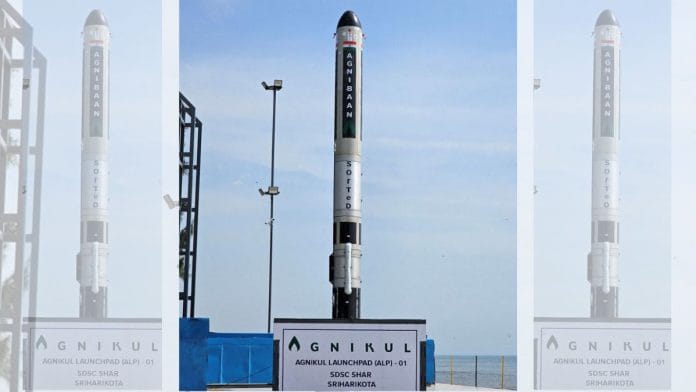New Delhi: Chennai-based space start-up Agnikul Cosmos on Thursday successfully carried out a sub-orbital test-flight of its home-built 3D-printed semi-cryogenic rocket — Agnibaan — from its own launch pad at Sriharikota, making it India’s second private entity to do so.
After four unsuccessful attempts, the test-flight on Thursday was carried out without any live-streaming and in presence of fewer dignitaries at the Sriharikota launch pad located within ISRO’s Satish Dhawan Space Centre.
“Congratulations @AgnikulCosmos for the successful launch of the Agnibaan SoRTed-01 mission from their launch pad. A major milestone, as the first-ever controlled flight of a semi-cryogenic liquid engine realised through additive manufacturing,” the ISRO said in a post on X.
“Elated at the successful launch of Agnibaan SOrTeD by @AgnikulCosmos ! A historic moment for India’s space sector. Powered by the world’s first single piece 3D printed semi-cryogenic engine, this achievement showcases the brilliance of our young innovators,” Pawan Goenka, Chairman, Indian National Space Promotion and Authorisation Centre (IN-SPACe), said on X.
This was the fifth attempt by Agnikul to launch the Agnibaan Sub-Orbital Technology Demonstrator (SOrTeD) since March 22.
“This is a huge boost and a proud moment for India’s thriving private space industry and just a glimpse into what the future holds for us, our hearty congratulations to the entire team behind this and best wishes for their future efforts,” Lt Gen A K Bhatt (retd) Director General, Indian Space Association (ISpA) said.
Agnibaan is a customisable, two-stage launch vehicle that can carry a payload of up to 300 kg into orbit of about 700 km, according to the company.
The rocket uses a semi-cryogenic engine with a mix of liquid and gas propellants, a technology that is yet to be demonstrated by the Indian Space Research Organisation (ISRO) in any of its rockets.
The SOrTeD mission is a single-stage launch vehicle demonstration that will be powered by a semi-cryogenic engine, the Agnilet, a sub-cooled liquid oxygen-based propulsion system developed indigenously.
The start-up has readied the vehicle with the first-ever ethernet-based avionics architecture and fully in-house developed autopilot software from India.
Powered by sub-cooled Liquid Oxygen (LOX) and Aviation Turbine Fuel (ATF), the vehicle is equipped with four carbon composite fins to provide passive control.
The Agnilet engine is the world’s first single-piece 3D-printed semi-cryogenic rocket engine.
The mission will last just over two minutes from launch to splashdown.
Following lift-off, the vehicle is expected to perform a pitch-over manoeuvre nearly four seconds into flight.
This manoeuvre involves the controlled rotation of the vehicle to change its orientation from vertical to a predetermined angle with respect to the ground or its flight path.
The vehicle will then go into the wind-biasing manoeuvre at just over 39 seconds, which is introduced in rockets to compensate for the effects of wind on the trajectory of the rocket during ascent.
At 1 minute 29 seconds, the launch vehicle is expected to reach apogee, the point it will be farthest from the launch site before it splashes down at just over two minutes into the flight, marking the completion of the mission.
This report is auto-generated from PTI news service. ThePrint holds no responsibility for its content.
Also read: Space startup Agnikul Cosmos aborts launch of India’s 1st semi-cryogenic engine rocket for 4th time






